Abarth 595 Review 2024
Written by Andrew Brady
Quick overview
Pros
- Massive character
- Looks
- Faster models pack a big punch
Cons
- Rear seat space? Err…
- Running costs
- Feels very dated in every way
Overall verdict on the Abarth 595
"Long before Fiat launched its retro-cued Fiat 500 and turned up the wick with the Abarth models, fast and fun small cars were a relatively common sight on our roads. Most of the mainstream makers had a compact, lightweight pocket rocket ready to fire some excitement into your daily drive, yet by the time Abarth unveiled its first hotted-up modern 500 in 2008, the market had all but disappeared."
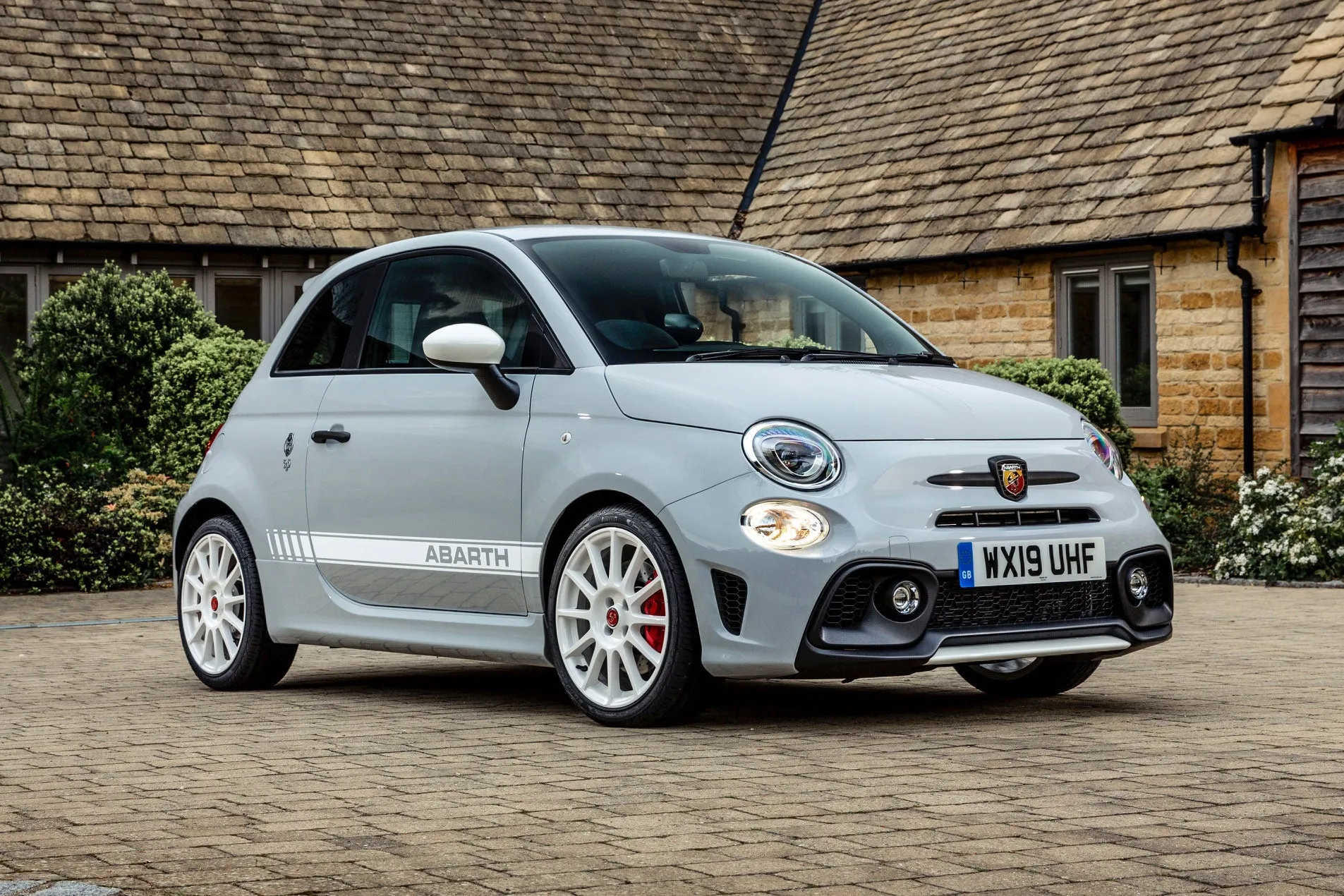
It's not exactly a secret that the Abarth 595 is based on the popular Fiat 500 of course. But this is more than just a tweak here and there. Abarth has taken Fiat's little city car and turned it into a bona fide hot hatch. Found out how in our Abarth 595 review.
When it was first launched back in 2008, it was called the Abarth 500 (referencing the car it was based on). Four years later in 2012 and it was rebadged the Abarth 595, while it's seen a number of improvements and power enhancements over its lifetime.
The range kicks off with the straight no nonsense Abarth 595 that's available as a either a hatchback or convertible, known as the Abarth 595C. Whichever version you go for, you'll get a turbocharged 1.4-litre four-cylinder engine producing anything from 145PS to 180PS. That’s a decent amount in a car this small and will shove you from 0-62mph in a not too shabby 7.8 seconds even with the least powerful model.
In the past there have been a number of special edition models of the Abarth 595 with even more power. Take the Abarth 595 Pista. This came with an extra 20PS to deliver 165PS and a 0-62mph time of just 6.8 seconds. Still not quick enough? There are the Competizione or Esseesse versions of the Abarth 595 that each pack a huge 180PS under the bonnet and sprint from 0-62mph in 6.7 seconds. You'll have to find these on the used market now as they're no longer available to order new with the Abarth 595, though you can still order the more track-focused Abarth 695 with a 180PS engine. On the other hand, the 165PS engine is the most commonly found version on the used market, and new Abarth 595s come with the same power output.
For now, the only other trim choice available with the Abarth 595 is the Turismo version. Packing the same power and performance as the standard car, this version comes with more luxury kit such as leather upholstery, climate control and rear parking sensors.
So, you can see the Abarth 595 may be small, but it offers a wide range of options to buyers even in the face of hot hatch opposition from the like of the Volkswagen Up GTI and Renault Twingo GT.
There’s no doubt that both of these rivals are more sophisticated cars in most senses, but this is part of the appeal of the Abarth 595. It’s a raw little car that delivers a big hit of fun and driving thrills. You only need to hear the noise it makes when you turn the key to start the engine to know it’s a little bit special and, maybe, just a bit pazzo. After all, why have a pint-sized hot hatch if it’s not going to make you smile every time you get in it?
Of course, there are downsides such as the Abarth 595’s handling and ride both feeling quite dated next to newer rivals. The cabin is best described as for two with occasional rear seats. Still, it's easy to overlook this when the Abarth 595 has so much character and charm for the price of a fairly basic supermini and a lot less than a Volkswagen Polo GTI.
heycar has 1000s of used cars for sale, including a wide range of Abarth 595s for sale.
Is the Abarth 595 right for you?
Like so many Italian sporting cars, the Abarth 595 is a car that, if it needs explaining, is probably not for you. There’s little common sense attached to choosing this car as the cabin is cramped, it has high running costs and there are more able, sophisticated hot hatches out there for the same money or less depending on which version you choose.
Yet, and yet, the Abarth 595 holds a certain appeal. It’s the mouse that roars, a car that punches much higher above its weight in terms of fun and personality and kudos that draws in buyers. All of this comes down to the Abarth 595 being a car that makes you smile, so it’s little wonder that many of its owners also have many far more expensive and exotic cars alongside the 595 in their garages.
This is part of the joy of the Abarth 595 is you become part of a covert club. For some, that will be just as off-putting, but there are plenty of other hot hatches out there to pick from. The Abarth 595 may be flawed but that doesn’t necessarily detract from what makes it really rather special.
What other cars are similar to the Abarth 595?
It’s not often the MINI Cooper S will be accused of being too big, but that’s the case when it’s compared to the Abarth 595. So, the only real rival to the Italian is the Volkswagen Up GTI that is now only available on the used market. The Up is slower but no less fun to hustle down country lanes thanks to its willing engine and agile handling.
Others to look at in this little corner of the hot hatch market are a used Renault Twingo GT or Suzuki Swift Sport. Neither matches the Abarth on pace or fun, so that leaves the Ford Fiesta ST as the only other credible rival at the same sort of price.
Comfort and design: Abarth 595 interior
"In transforming the Fiat 500 into the Abarth 595, Fiat’s in-house tuning arm has made a lot of changes to the driver’s environment. This means you get sports pedals, a smaller, thicker-rimmed steering wheel and an Abarth version of the infotainment screen."
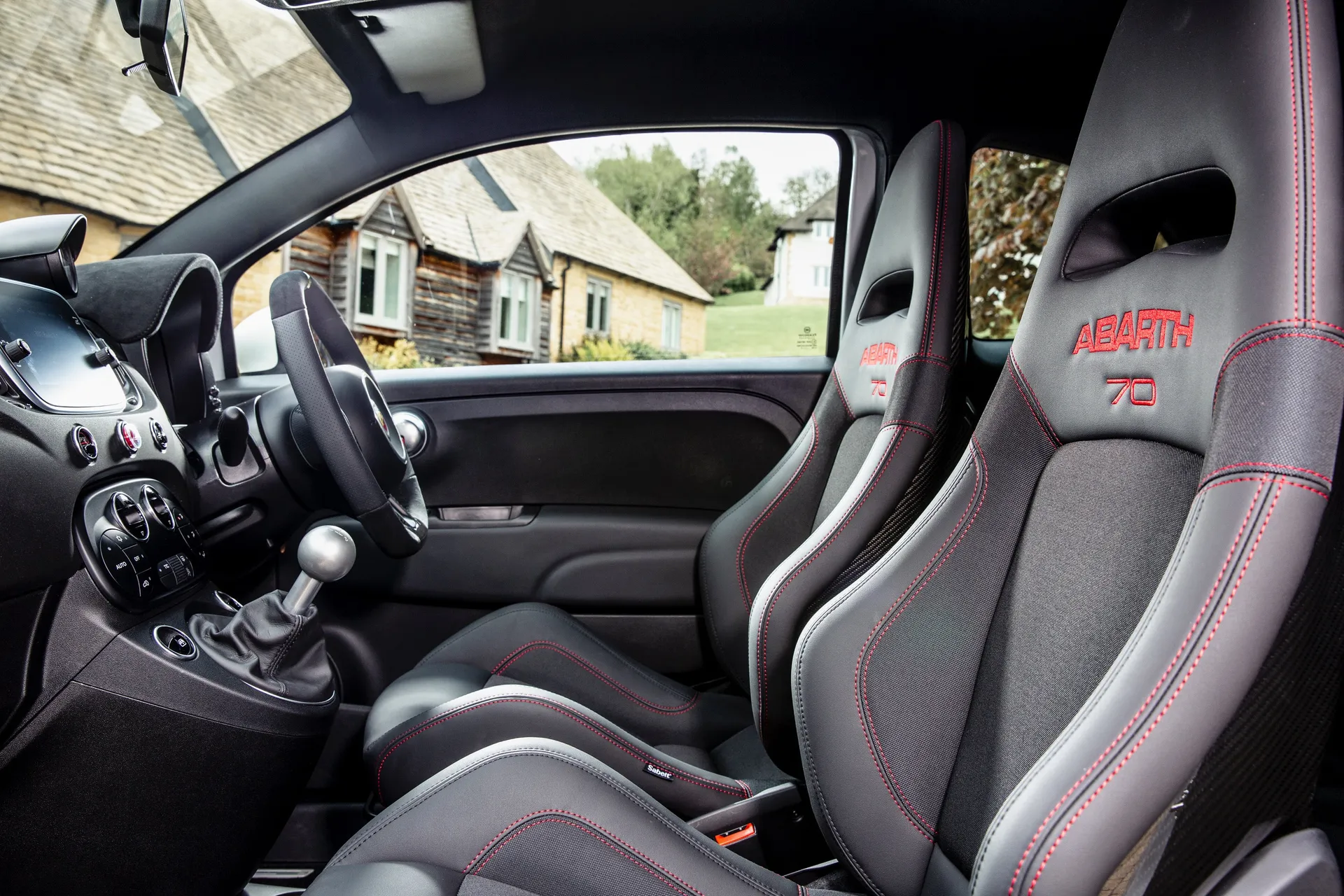
The sports front seats are another big tell-tale that you are getting into a hot hatch as they are heavily bolstered and look ready for the race track, never mind the weekly shop. However, the seats do not address the overly upright driving position found in other Fiat 500 variations.
In a hot hatch, it just feels a bit odd to be perched on top of the car and almost hunched over the steering wheel. Despite this, the seats themselves are comfortable and provide ample support when you’re using the Abarth’s considerable cornering ability.
This is compounded by the cramped foot well that requires the driver to twist his or her left ankle to get comfortable on longer drives when you don’t need to cover the clutch pedal all of the time. This leads to an awkward driving position and that misery is further troubled by the steering wheel only adjusting for angle, so finding the right seating set-up is by no means guaranteed for every driver.
On the up side, the Abarth is such a compact car that seeing out of it in every direction is a doddle and parking is far simpler than in any of its rivals. Even so, Abarth fits parking sensors to all models, just in case.
The dash itself is laid out in the same way as the Fiat 500’s, so the main instrument pod presents information in a clear, bright digital display. Abarth positions the gear lever up high in the middle of the centre console, so it’s only a flick of the wrist away at any moment. Also, the infotainment screen is easy to read on the move, and the 5.0-inch screen was updated to a 7.0-inch item from early 2020.
Quality and finish
If there is one particular area where the Abarth 595 range is really beginning to feel its age and lag behind its rivals, it’s in the fit, finish and construction of its cabin. It looks good to the eye, but when your hands come into contact with the car there are too many hard, cheap-feeling plastics that undermine the experience. In the normal Fiat 500 it’s almost forgivable, but in a car costing as much as the Abarth versions it’s much harder to overlook.
There are other details that make you ponder the quality of the car, such as the lack of a foot rest for your left shoe when not working the clutch.
However, the leather used on the seats of higher spec Abarth 595s adds a touch of class that is welcome. The same is true of the way the controls work as the gear shift has a decent heft to it that speaks of sporting intent and the steering wheel is just the right thickness to let you know this is a hot hatch long before you turn the engine on
Infotainment: Touchscreen, USB, nav and stereo in the Abarth 595
The 5.0-inch Uconnect infotainment screen in the Abarth 595 up to the start of 2020 is common to all models of the period and positioned high in the centre of the dash as it is in the Fiat 500. The screen itself has a clear, well defined resolution so it’s easy to read the information present on the display.
The system comes with DAB digital radio, Bluetooth connection and a USB port, so it’s easy enough to link up with your smartphone. The basic model does without mirroring tech, but the others get Apple CarPlay and Android Auto to pair with smart devices easily and offer access to their apps.
Choose the base 595 or Pista models and you do without satellite navigation, while the optional Hifi by Beats is there for all but the Pista model.
In all of the Abarth models, the infotainment screen is quick to react to the touch of your finger on the screen. It has logical menus and there are shortcut buttons to take you to the most important common functions immediately.
From early 2020, the infotainment screen was enlarged to a 7.0-inch item with high-definition touchscreen, DAB radio and Apple CarPlay and Android Auto compatibility. Satellite navigation was an option, along with the refined and powerful BeatsAudio upgrade.
Space and practicality: Abarth 595 boot space
Given the exterior dimensions of the Abarth 595 at 3657mm long, 1893mm wide and 1485mm tall, it was never going to be the roomiest on the inside for anyone not sitting in the front pair of seats. While they enjoy surprisingly good headroom and enough space for legs and shoulders, those in the rear are far from as well catered for.
Unless the person in the front seat is especially short in stature, there really isn’t enough leg room in the back of the Abarth 595 for adults. Even older kids will find it a squash and a squeeze back here as the sporty front chairs eat up the inches. It really means the Abarth is better regarded as a two-seater with the option to carry a couple of extra passengers for very short journeys.
This approach will also save you from inflicting the Abarth’s rear seat access on to your friends and family. While the doors open wide, the front seats don’t slide forward sufficiently to give much room to fit through. And once installed in the back, there is also not much headroom for adults. Choosing the Convertible models doesn’t worsen the rear room for heads, but at anything above town speeds back seat passengers will be blown about by the breeze when the fold-back canvas top is slid open.
The Convertible also comes off worse when looking at the boot of the Abarth 595. This is because the roof design means the rear hatch gives way to a lid that opens to reveal a small aperture. The boot itself isn’t any smaller than the hatch’s but the restricted opening means fitting anything bigger than a carry-on flight case in there will be a struggle.
With the hatch’s fully opening tailgate, fitting in bigger bags is simple, though you will very quickly fill the available space of 185-litres. The rear seats are divided 50-50 and tumble forwards to free up more room, which is probably a better use of the rear seat space. Even so, the 595 is not going to be the go-to car when you head to the DIY store and even a Volkswagen Up GTI makes for a more practical small car, never mind the likes of the Ford Fiesta ST.
Handling and ride quality: What is the Abarth 595 like to drive?
"Such a compact hot hatch should be in its element on niggly back roads where constant changes of direction favour smaller cars like the Abarth 595 that can more use of the available space. This is true up to a point as the Abarth has plenty of grip in all of its different versions, but it’s not the most able small hot hatch due to its firm ride."
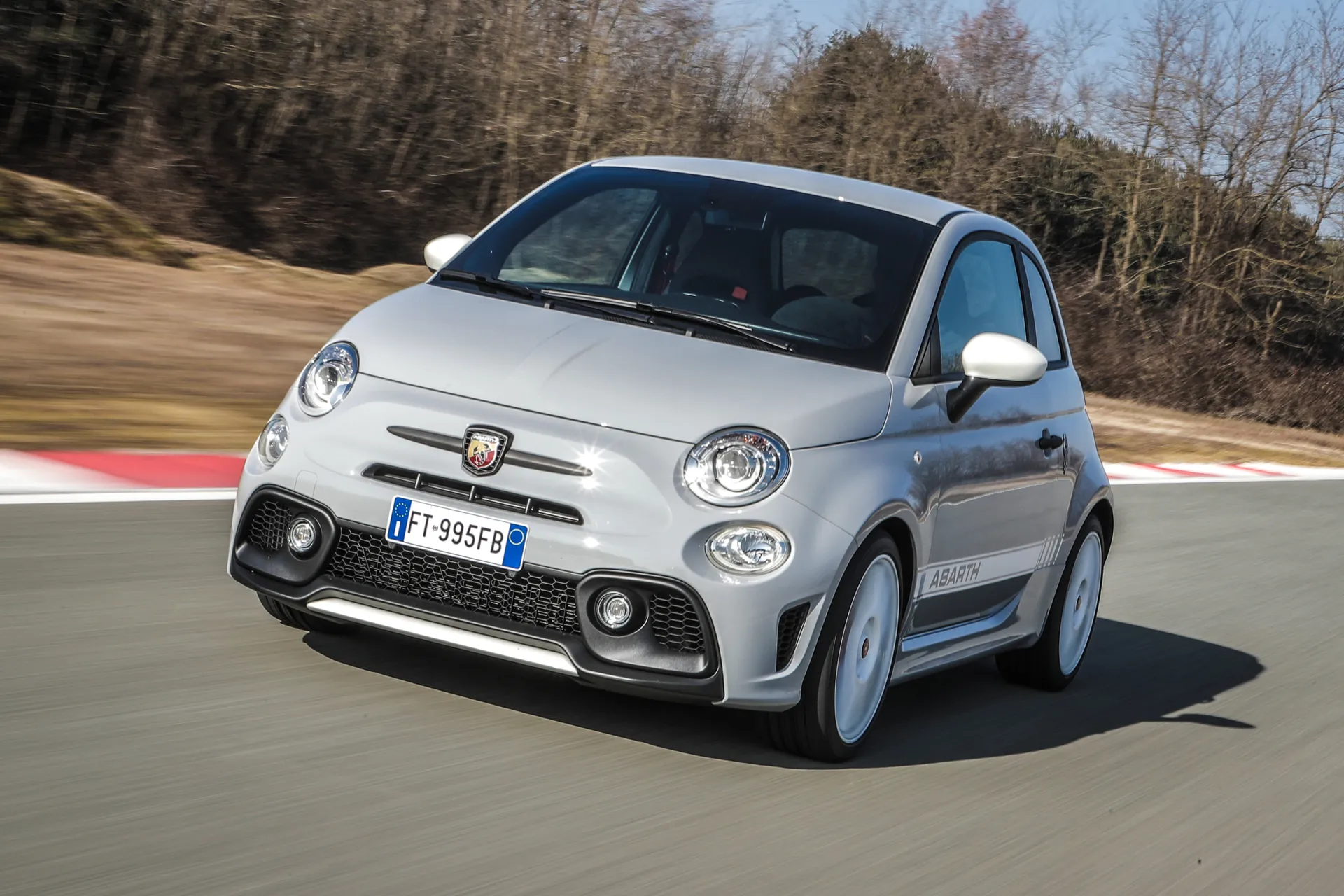
On anything other than a surface that’s as smooth as Italian gelato, the Abarth 595 can get rather jiggly rather quickly. Its short wheelbase combined with the fat tyres and firm suspension introduce a hard edge that sees the car pinballing from one bump to the next, which is not what you want when you encounter these obstacles mid-corner.
A little more give in the suspension would go a long way to solving this and we’d also like greater feedback through the steering, which is a bit lifeless when compared to the sensory delights of the Ford Fiesta ST’s. Along with this, the front end bite of the Abarth is also dependent on which model you choose.
Go for the Competizione or Esseesse versions and you get a limited slip differential, as well as better suspension dampers, to get the power down effectively and make the most of the car’s talents in the bends. On the lesser versions, the front end can become quite choppy and unruly as the power reaches a peak.
As for ride comfort, the Abarth 595 really shows its age in this department. Where a Ford Fiesta ST or Volkswagen Up GTI can provide a good deal of comfort, the Abarth’s suspension is always firm and busy over the bumps, letting every undulation and dimple in the road’s surface make itself felt in the cabin. For some, that will be the sensation of a sports car, but in a hot hatch we’d like a more rounded suite of ability.
What engines and gearboxes are available in the Abarth 595?
The 1.4-litre T-jet turbo petrol engine in the Abarth 595 comes in three states of tune, comprising 145PS, 165PS and 180PS forms. For the 595, 145PS feels like a reasonable amount without it ever tipping over into overwhelming the front tyres’ grip and traction. Move to the 165PS Pista and Turismo models and it feels like the chassis is being challenged. The current versions come with the 165PS engine as standard.
As for the Competizione and Esseesse with 180PS, they are rapid and knock off 0-62mph in 6.7 seconds but feel like they are on the edge of the 595’s dynamic ability.
In every version, the 1.4-litre engine feels bigger and more potent that its size suggests, so you can zip past slower traffic with ease. They rev up eagerly with no delay from the turbocharger, yet they will also cruise with a pleasing amount of refinement and power to spare.
Also, despite considerable power outputs in the faster versions, the 1.4-litre engine is never temperamental or peaky when driven in town. We also like the weighty feel of the six-speed manual gearbox. There’s an automated version of this transmission operated by buttons on the centre console, but we’d leave well alone as it’s sluggish to respond and spoils the Abarth’s fun.
Refinement and noise levels
You can forget about sneaking out of your driveway early in the mornings and not waking the neighbours when you drive an Abarth 595. It has an exhaust note that sounds more like that of an Italian supercar than a tiny hot hatch, but this is part of the fun of the 595. It’s also even louder in the Competizione thanks to its Record Monza exhaust and the Esseesse that comes with a bolt-on Akrapovic system.
However, inside the cabin, the 595 makes a passable stab at being reasonably quiet when pottering through town or cruising on the motorway. Yet, make the most of the engine’s power and it comes alive with whooshes from the turbocharger.
There’s also a fair degree of rumble from the broad tyres as they grip the road and you’ll also get some wind noise at the national speed limit. This is more obvious in the Convertible but it not excessive.
Safety equipment: How safe is the Abarth 595?
Like the Fiat 500 it’s developed from, the Abarth 595 comes with a good array of standard safety equipment. This extends to twin front, side and curtain airbags and another for the driver’s knees. There are also anti-whiplash headrests, and ESP traction and stability control.
However, this was not enough to score the Fiat 500, and by association the Abarth 595, any better than a three-star rating in Euro NCAP crash tests. This was predominantly down to the poor provision of crash-avoiding technology as there’s not even the option of autonomous emergency braking or a lane keep assistance system.
You do get three-point belts for all four occupants and the most powerful Competizione and Esseesse models come with larger front brakes to help rein in their speed.
MPG and fuel costs: What does a Abarth 595 cost to run?
"For a pugnacious little hot hatch, the Abarth 595 is still able to offer reasonable fuel economy given its performance potential. The most frugal are the Pista and Turismo models with their 165PS version of the 1.4-litre T-Jet turbo petrol motor."
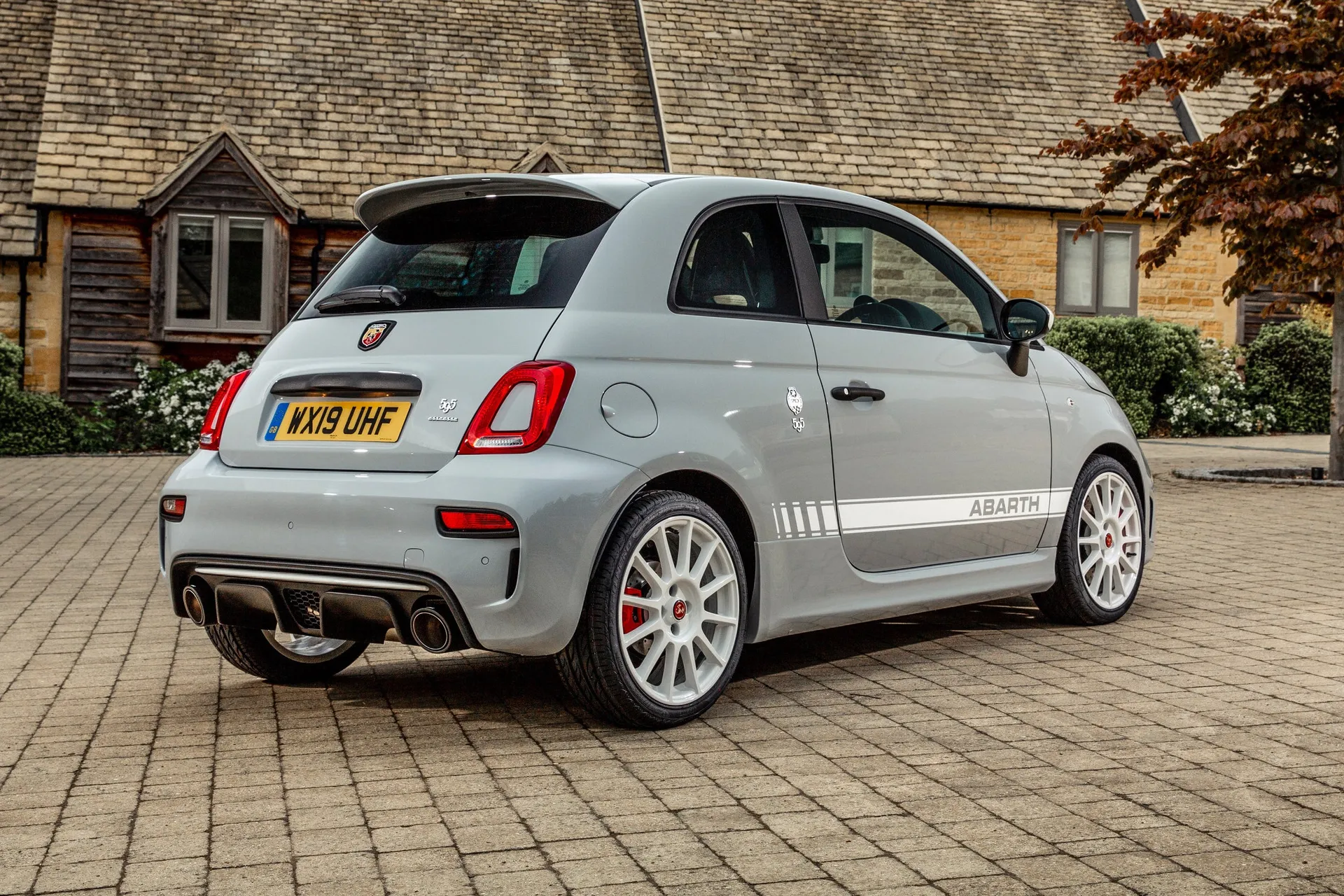
The 595 with the 165PS engine and manual gearbox offers 40.4mpg combined economy under the WLTP testing methods.
Take the 180PS models and they claim 42.2mpg, while Real MPG rates them at an impressive 44.8mpg to exceed the official economy.
How reliable is the Abarth 595?
Disappointingly, Fiat didn't even feature in the latest HonestJohn.co.uk Satisfaction Index. The good news is that most Abarth models will be cared for better than the average Fiat 500, so will prove more reliable in the long term.
Insurance groups and costs
If you're looking at a new Abarth 595, insurance falls into group 30.
No need to hold the front page when we tell you the cheapest Abarth 595 to get insurance cover for is the model with 145PS - the least powerful engine option. It sits in group 26, which is much the same as the Ford Fiesta ST.
Move up to the 165PS Pista and Turismo versions and they fall into group 29, while the all-out 180PS Competizione and Esseesse models are a little further up the scale in group 34 alongside larger and faster hot hatch offerings such as the Ford Focus ST.
VED car tax: What is the annual road tax on a Abarth 595?
Take the Abarth 595 with the manual gearbox and you will pay road tax for the first year of £680, which is the same for the MTA automated manual transmission.
For the second year and those following after, road tax will come in at a more reasonable £190 per year.
How much should you be paying for a used Abarth 595?
"A six-year old Abarth 595 with 50,000 miles on the clock will cost you around £9000."
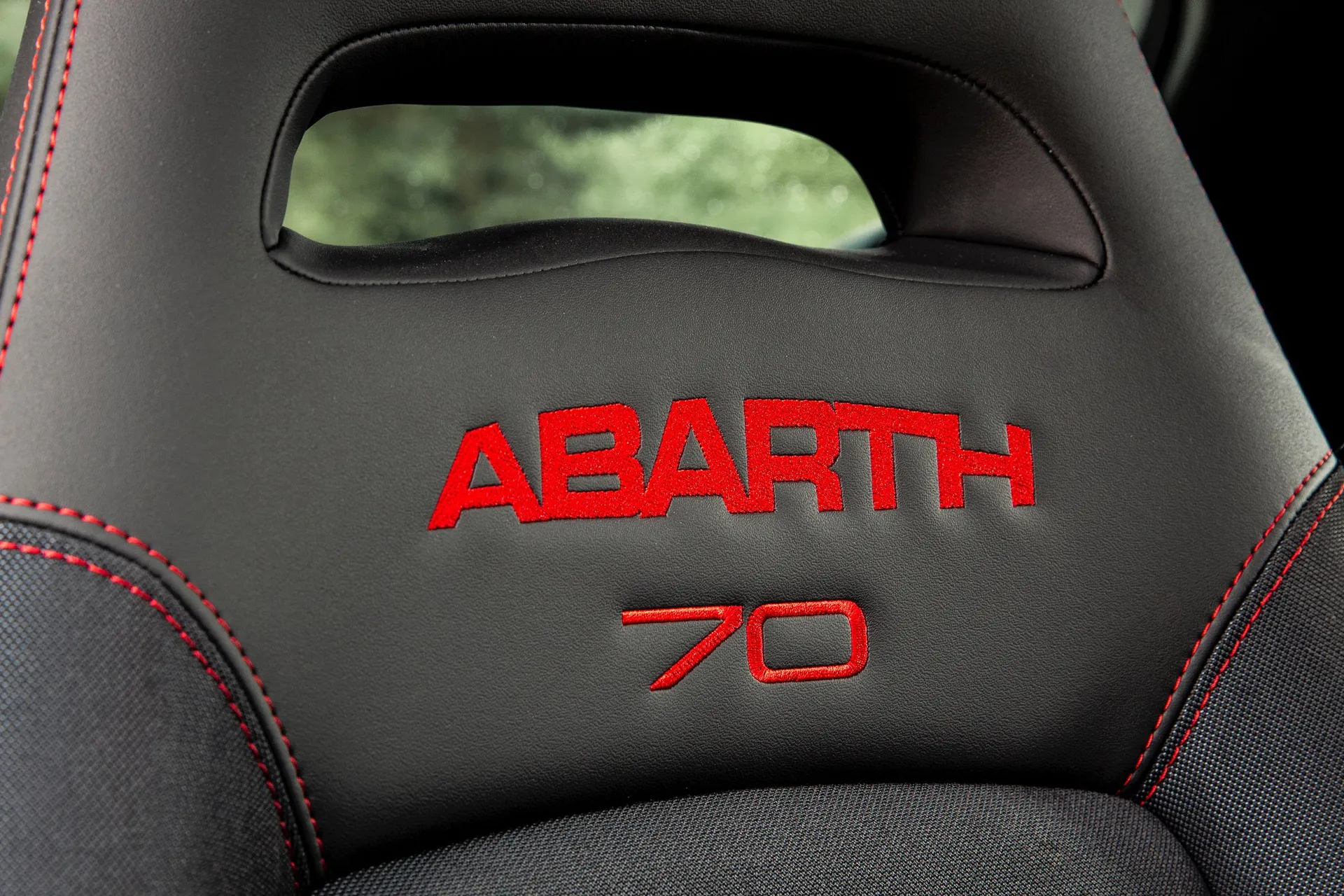
You can add £2000 to that figure for a Pista model with the more powerful engine, while a Competizione or Esseesse with the most potent motor will require you to dig out a further £1500 from the piggy bank.
If you’d rather have a nearly new Abarth 595, choosing a pre-registered example will save you about £1000 on the list price whichever version catches your eye. That means paying around £22,500 for one with delivery mileage only.
Trim levels and standard equipment
The entry-point Abarth 595 did come with 16-inch alloy wheels, satin chrome door handles, LED headlights, twin exhaust pipes, and a honeycomb grille with Abarth logo. The Abarth 595 Convertible comes with rear parking sensors, but not the hatch. On the inside, it provides fabric upholstery and front sports seats, as well as the 5-inch Uconnect infotainment screen.
Now, the current Abarth 595 has 17-inch wheels as standard, along with black front and rear bumpers, rear parking sensors, climate control, and a 7.0-inch infotainment screen. The Turismo adds leather upholstery to the mix, along with automatic climate control.
The Abarth 595 Pista gained 17-inch alloys, colour-coded door mirror caps, bumper inserts and brake calipers, and four exhaust pipes. For the interior, you get air conditioning, aluminium pedals, and the infotainment gains Apple CarPlay and Android Auto mirroring for your smartphone. There are also uprated Koni dampers for the rear suspension to improve handling.
With the Abarth 595 Competizione, you got unique 17-inch alloy wheels, larger front disc brakes and the Record Monza exhaust system. It also has Abarth Corsa racing front seats and Alcantara covering the instrument binnacle.
The Abarth 595 Esseesse model came with white-painted 17-inch Supersport alloy wheels, Akrapovic performance exhaust, Abarth racing seats and carbon fibre detailing in the cabin.
Ask the heycar experts: common questions
What's the difference between the Abarth 595 and Abarth 695?
How much is an Abarth 595?
Who makes the Abarth 595?
Get our latest advice, news and offers
Keep me updated by email with the latest advice, news and offers from heycar.
By submitting you agree to our privacy policy



